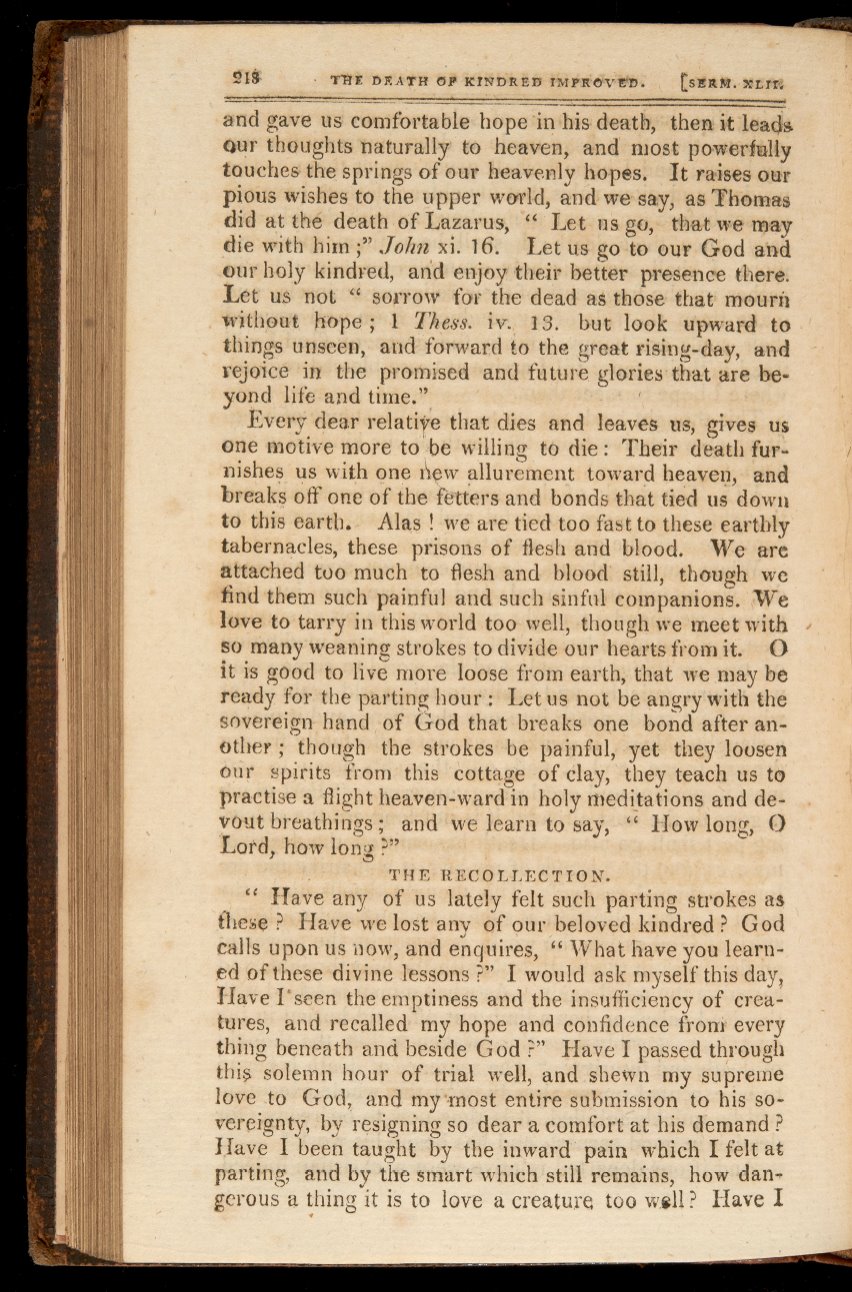

THE DEATH
DP
KINDRED IMPROVE'D.
CSRRM. JILIT3
and
gave us
comfortable hope
in his
death,
then
it leads
our
thoughts naturally
to heaven, and most powerfully
touches
the springs
of our
heavenly hopes.
It
raises
our
pious
wishes
to the
upper
world,
and
we say,
as
Thomas
did
at
the
death
of
Lazarus,
"
Let
us go,
that
we
may
die
with him
;"
JoIm
xi. 16.
Let
us go to
our God and
our
holy
kindred,
and
enjoy
their better
presence
there.
Let
us
not " sorrow for
the dead
as
those
that
mourn
without
hope
;
1
Mess.
iv.
13.
but
look upward
to
things unseen, and forward
to
the
great
rising-day, and
rejoice
in
the promised and
future
glories
that
are
be-
yond
life
and time."
Every
dear
relative
that
dies
and
leaves
us,
gives
us
one
motive more to
be
willing to die
:
Their
death fur-
nishes us with one
new
allurement
toward heaven, and
breaks
off one
of
the
fetters
and bonds
that
tied
us
down
to
this
earth.
Alas
!
we
are
tied too fast
to
these
earthly
tabernacles,
these prisons
of
flesh
and blood.
We are
attached too
much to
flesh
and blood
still,
though
we
find them such painful
and
such sinful
companions.
We
love
to
tarry
in
this world
too
well,
though
we
meet
with
so many weaning strokes
to divide
our hearts
from it.
O
it
is
good to
live
more loose from earth,
that
we
may
be
ready
for
the parting
hour
:
Let
us
not
be
angry with the
sovereign hand
of God
that
breaks
one
bond
after an-
other
;
though the strokes
be
painful,
yet
they loosen
our
spirits
from this
cottage
of
clay,
they teach
us
to
practise
a flight heaven -ward
in
holy
meditations
and de-
vout
breathings
;
and
we
learn
to say,
"
How long,
O
Lord,
how
long
?"
THE
RECOLLECTION.
"
Have
any
of
us
lately felt
such
parting
strokes as
these
?
Have
we
lost
anv
of
our
beloved
kindred?
God
calls
upon
us now,
and enquires,
"
What
have
you
learn-
ed
of
these divine
lessons
?"
I
would ask myself this
day,
Have I'
seen the emptiness
and the
insufficiency
of crea-
tures,
and recalled
my
hope and confidence
from
every
thing beneath and
beside
God
?"
Have I
passed through
this solemn
hour
of
trial
well,
and
shewn
my
supreme
love to
God, and
my
most
entire
submission to
his
so-
vereignty,
by
resigning
so
dear
a
comfort
at
his
demand
?
llave I
been
taught
by
the
inward-
pain
which
I
felt
at
parting, and
by
the
smart
which still
remains,
how
dan-
gerous
a
thing it
is
to love a
creature
too well? Have
I

















